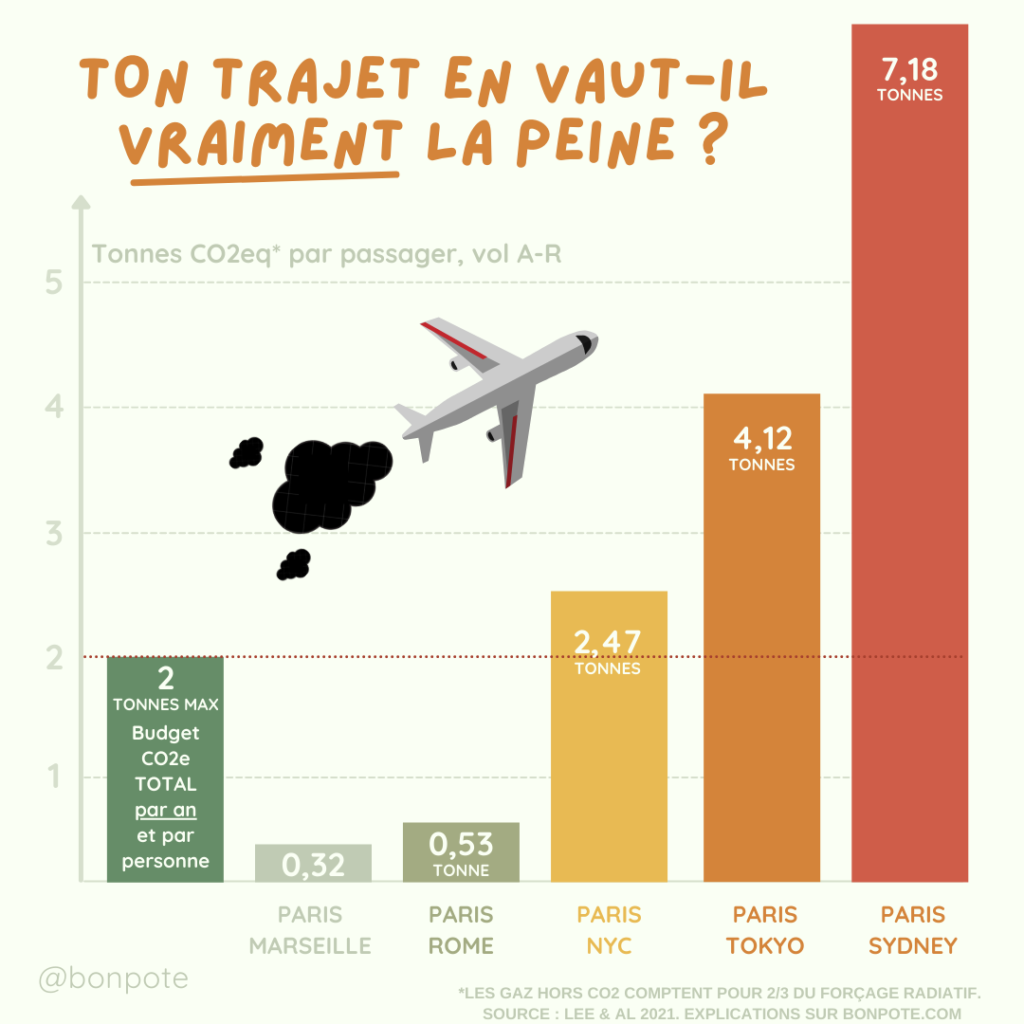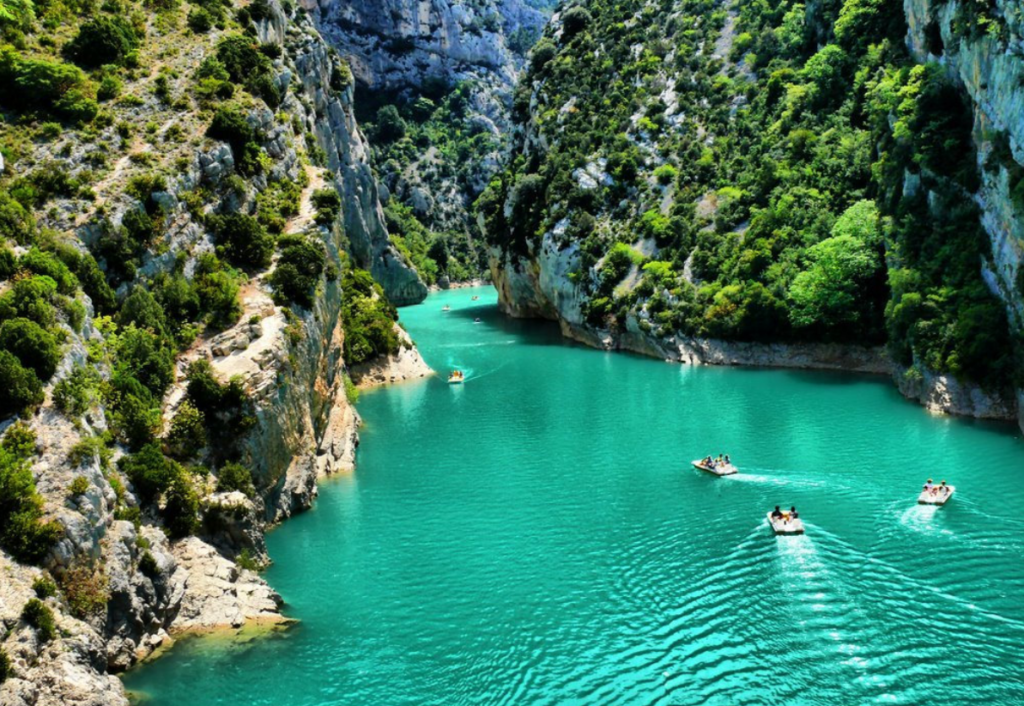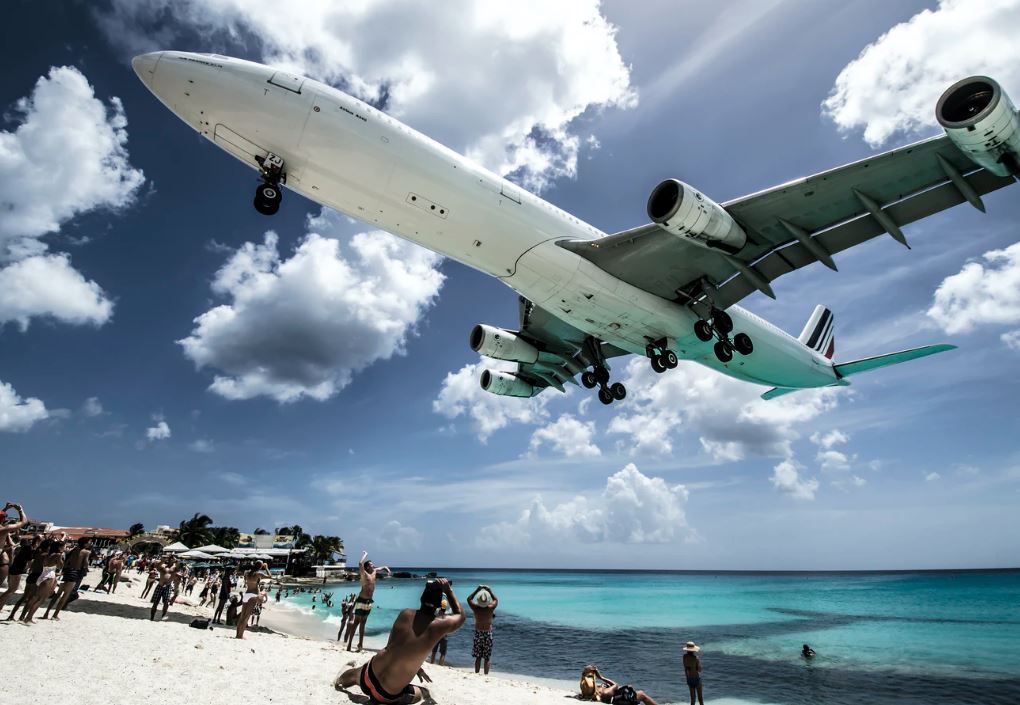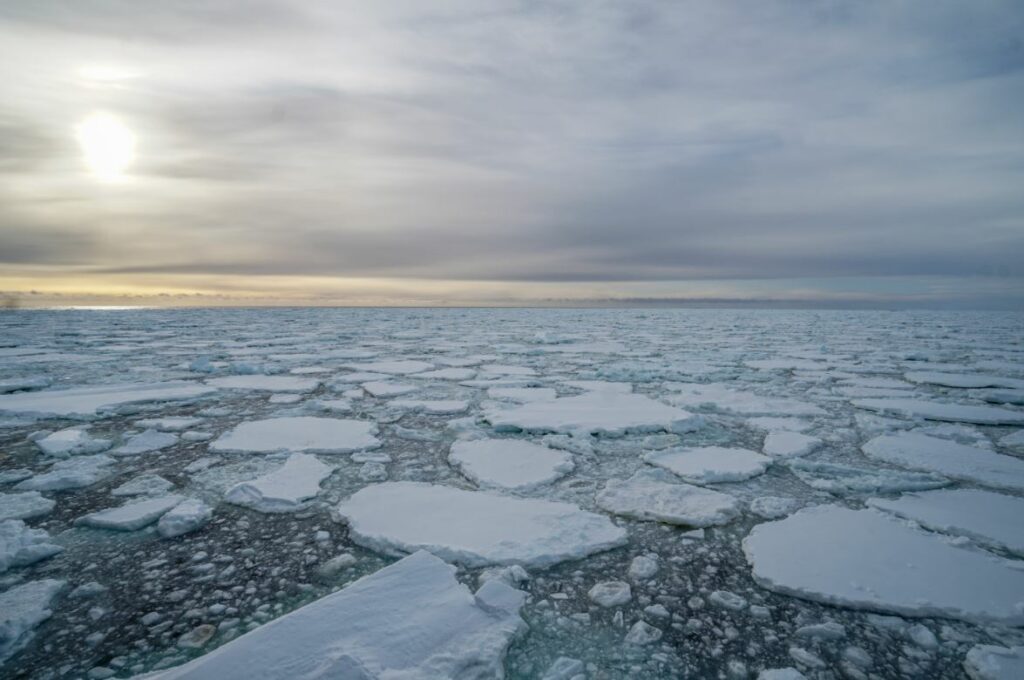Is flying an ecological nonsense?
As a prologue, I’d like to quote what physicist-climatologist and author of the fifth IPCC report François-Marie Bréon said in a hearing at the National Assembly in July 2019:
“I think the vast majority of people don’t realise what it means to go carbon neutral, or even to divide our emissions by four. (…) Obviously, France cannot achieve dividing its greenhouse gas emissions by 4 whilst maintaining air transport, that’s just plain impossible.. Many such questions arise. The fact that there is still this kind of debate shows that we have not realised what it means to divide greenhouse gas emissions by 4. »
How is it possible then that Members of Parliament are compared to Green Khmers when they propose to introduce quotas on air transport? There are two main points : Denial , and misconceptions about the orders of magnitude (both are cultivated by the aviation lobby, as will be explained further down.)
I’ll be transparent: I had been flying most of my life… until I read about the impact it had on climate change. So I hope that after reading this article, you’ll reconsider flying next time the occasion arises
Flying’s unequivocal carbon footprint impact
As a reminder, the average carbon footprint of a French person is about 10 tonnes of CO2eq/year, and the goal is to reduce it to a maximum of 2 tonnes of CO2eq/year. Now that we have this figure in mind, let’s look at what it ‘costs’ to go to New York for example. While I use at least 5 different comparators, I always end up with a figure above 2 tonnes. On climatMundi, Greentripper, Ecolab… The one exception (how surprising!) is the DGAC‘s website – Direction Générale de l’Aviation Civile – which does not take into account the condensation trails nor the cirrus clouds that form after a plane has passed.
However, they should be taken into account, as this triples the impact of radiative forcing.You can calculate the carbon footprint of your flight in 3 clicks with this simulator..
Here is a graph that neatly summarises the situation. If you were to remember just one image, here it is:

Obviously, if NY is already too much for one year, so is any destination in America and much of Asia. Keep in mind that we are only talking about the journey. We will also have to get around, feed ourselves, heat ourselves… In other words, if you have friends in Miami, Sydney or Shanghai, now is the time to install Skype.
Manipulating figures to keep on flying
‘Yes, but the aviation sector only accounts for 2% of emissions in France’.
I hear this argument about air transport EVERY SINGLE DAY. “Yes, but that’s only 2% of emissions, whereas, you know, cars…’. This behaviour has a name: Whataboutism. Yes, I pollute, but the other guy pollutes more! This is a huge statistical bias that the whole industry (and those who fly to avoid cognitive dissonance) relies on. The sector would account for a couple of percent of emissions “only”.

Max is a professional pilot. Max likes whataboutism.
Let’s be clear: Everything needs to be called into question. Given the cut in CO2eq emissions that we must achieve every year, 1% is an enormous amount. There will be no small profits. Any reduction in emissions is good for you. Just because the other guy pollutes more doesn’t mean you shouldn’t make an effort. If we had to wait for the Americans to have an individual carbon footprint of 2t CO2eq/year to change something, we would wait a long time.
Carbon accounting: Play with the figures, lower your emissions!
Now let’s take a closer look at the 2%. According to B&L Evolution, the carbon “weight” of flying in French emissions in 2018 varied from one to ten timesdepending on the different approaches and the comprehensiveness of the GHGs scope used

The orders of magnitude are much the same if we look at French official statistics: Air CO₂ emissions represented only 2.8% of transport emissions and 0.8% of total greenhouse gas emissions in 2016.
However, these low figures are explained by the fact that only journeys within France are counted (including overseas territories). The sector itself sets its own climate targets through the International Civil Aviation Organization (ICAO), and national emissions inventories therefore reflect a purely national scope. It should also be noted that international air traffic has managed to escape all climate treaties and policies (with the help of the States, as we shall see). Here are two comments on this:
- Counting international journeys increases sixfold France’s air travel impact: It reaches 13.7% of transport emissions and 4.4% of the country’s total emissions. We are already slightly above the 1 or 2% generally announced by the sector…
- Do you think it would have been a good idea to tell Jérôme Kerviel ‘Thank you for imposing your own compliance rules Jérôme, we trust you, don’t mess around’ The answer is obviously no. The same applies to the aviation industry. Reducing the CO2 emissions of an activity is always coupled with a reduction in profits. Saving or saving the environment, you have to choose.
Flying and climate justice
The fact that travels and emissions are concentrated on a limited number of users makes air transport a clear marker of climate injustice. The main emitters are the most affluent populations, while the first victims of the consequences of climate change are and will remain people who will mostly never get on a flight.
Flying increases the carbon footprint. And even if some brandish the famous 2%, this 2% is merely a statistical bias. On a national scale, the responsibility of the small percentage of people who fly regularly is totally diluted by those who fly only once a year… Or not at all. The graph below, from Cambridge University, is once again revealing of the carbon footprint impact of flying at the European level, which has exploded for the richest:

This is a cogent reminder: It is the most affluent households that fly, and that generally have the highest carbon footprint. No matter what influencers, stars and other digital nomads say, we need to slow down.
The Parisian wanker example
Since self-deprecation seems to be an effective tool to raise awareness, let’s take the example of the Parisian wanker once again. I remember my puzzlement when my roommate had the amazed eyes of a child when he took a flight for the first time at age 20. But with hindsight and a few statistics, this is not surprising: in 2019, 20% of French people had never taken a flight in their lives, and this figure should remain more or less the same in 2020 (Covid-19..). Worldwide, 90% of human beings have never been on a flight.
What better example than the city of Paris to explain this imbalance? If you were still in doubt about whether Paris is an exceptional city, the answer is in the graph below. For better or for worse:

The 25% share of local emissions in the carbon footprint means that 75% of the emissions generated by Paris come from outside the French territory. The largest emitting sector is of course air transport (passengers and goods) with 33%. Flying: Just 2% of emissions?
High altitude greenwashing
Unsurprisingly, and just like everywhere else, a wave of greenwashing has taken hold of the aeronautics industry, in order to reassure everyone and, above all, to buy time and encourage the status quo.
1/ “Responsible” travel
We’ve already covered this aspect with the example of Air France’s tree planting, but scratch beneath the surface and you’ll see it’s of course the entire industry that denies any responsibility in polluting. These ‘lobbying’ campaigns have increased, particularly since the rise of the flygskam, a movement that advocates ‘flying shame’ for the sake of the climate. “Green flying” is next on the line, isn’t it?

I strongly encourage you to go and read ‘TRUE from FALSE‘, it’s a great intellectual exercise if you want to learn how to spot greenwashing and debunk it.
2/ But we have made such technical progress!
As the Shift Project points out, improving fuel efficiency has been an central objective for aircraft and engine manufacturers as the fuel efficiency of a new aircraft is a key determinant of its value. However, although real progress has been made, the consensus among engineers is that current aircrafts (engines included) have reached a technical-industrial limit which is unlikely to be exceeded.
Moreover, past progress in energy efficiency has mainly allowed for the development of traffic, which is a textbook example of Jevons’ paradox which no policy is trying to keep under control. The improvement is not sufficient to offset emissions, actually it even leads to an increase in demand which then exceeds the effects of the initial improvement. The overall and absolute result is then on the rise:

Finally, after months of discussions with people in the sector, it is clear that all the improvements (and that’s normal, everyone does the same) have been made primarily for economic rather than ecological reasons. Emissions have never really been a topic, except in recent years with the media hype, leading to climate change becoming the French’s number one fear.
3/ But anyway the flight will leave whether I’m on it or not!
You’ve almost certainly read or heard this argument before. “Oh that’s okay, the flight will leave whether I’m on it or not, I might as well enjoy it!“. This is unfortunately very common, and the answers are simple. Here are some elements to address this question:
- Demand swells the supply. Fewer tickets purchased = fewer flights. “When you think that it would only take people to stop buying for it not to sell,” as Coluche would say. Not too far from the truth.
- A company has to be profitable. Flying empty planes is a short term solution (partly observed during the Covid pandemic), but in the long term, the company stops flying. Combine this with the scandals and controversies of ghost flights, and you will see why this is unsustainable for a company.
- This argument is also valid for the train. How long do you think trains will be maintained if they are empty? Who will pay?
- Individual actions against global warming matter, so do collective actions. Both will be needed, and in this particular case, we will need changes in both supply and demand.
Also, and this is all too often forgotten, climate change is a moral and ethical issue. Daring to say “the flight will leave whether I’m on it or not, I might as well enjoy it” is the equivalent of going to the butcher and saying “oh well, the animal is already dead, I might as well enjoy it! “. As if you were obliged to do something, forced to do it, otherwise someone else would take advantage of it…
Finally, exemplarity is an major vector for change, especially when you have a large audience like influencers. Their carbon footprint doesn’t just stop at the trip they take to Bali or New York and then post on Instagram: it is much bigger than that.
NB: If the person continues to make excuses after hearing these arguments, use Brandolini’s law. This eco-survival guide might also come in handy…
NEWSLETTER
Chaque vendredi, recevez un condensé de la semaine, des infographies, nos recos culturelles et des exclusivités.
+30 000 SONT DÉJÀ INSCRITS
Une alerte pour chaque article mis en ligne, et une lettre hebdo chaque vendredi, avec un condensé de la semaine, des infographies, nos recos culturelles et des exclusivités.
The green growth festival among French politicians
What is most worrying is our politicians’ ability to ignore our experts. One of the demands from the High Council for the Climate in its first reportis very clear: ‘Targets for international transport, both air and maritime, should be integrated and raised to the same level as national targets‘, page 15, recommendation 7. This report calls for the same to be done as regards indirect emissions resulting from the consumption of imported goods.
Do you think they have done anything about it? No. Do you think that Madame Borne, then Minister of Ecological Transition and Solidarity, is in line with the Paris Agreement when she wants the expansion of Terminal 4 in Paris? No. Fortunately, Madame Borne has a great sense of humour and had given an absolutely incredible justification: Zero-carbon planes will be available in 2035. I am afraid I have some bad news, Madame Borne: There is no such thing as a pedal-powered flight from Paris to Rio.
Rest assured, Madame Borne is not alone in this. She was well assisted by Jean-Baptiste Djebbari, Secretary of State for Transport. Having spent his entire career in aviation and having wanted to create an airline, he is a strong believer in a ‘responsible’ aviation industry. Do you think, from the picture below, that Jean-Baptiste will make an objective choice for the future of French people, when he is told that air traffic must absolutely be reduced?

Education, the key to success
Icing on the cake.
As Valérie Cabanes recently reminded, the key to fighting climate change is education. I put myself in the shoes of a fourth grader who opens this book and comes across this page. I simply call this a scandal. Teddy Rinner may put on his best smile, but it’s a scandal to see it in a children’s book.

The next page is surely about how to get to the bakery with your SUV.
Unfortunately it doesn’t stop at children’s books, as the official sources available on the government’s website offer the same kind of greenwashing and brainwashing. See the image below: We need to REDUCE our emissions, not stabilise them. REDUCE. Is it really too hard to understand? Text comprehension, 4th grade level.

Life choice, choice of society
Beyond the scientific knowledge required to address it, climate change is primarily a societal problem. We need to think about what we can and should do to address this problem. Just like with professional sports, this requires making arbitrary choices about ‘what can continue’, ‘what needs to change, transform’ and ‘what needs to be stopped’.
The place we give to air travel in the future will therefore reflect a societal and ethical choice: Among the changes to be made to achieve a carbon-neutral world, are we prepared to sacrifice a few flight journeys to preserve acceptable living conditions in the decades to come? We will have to reduce (or even stop) some activities and not wait for innovations that will come (if they come at all) too late. In this respect, air transport is on the front line, since 75% of its transport volumes are dedicated to “leisure/family” and 25% to “business”.
Either we ourselves voluntarily reduce our emissions as part of the fight against environmental impacts, or the physical constraints of resource contraction will do it for us sooner or later. So bringing air transport into line with the Paris Agreement target will mean challenging traffic increases. This change will come about partly through changes in individual behaviour (travelling less far, less often, favouring other modes), but it will also require stronger international regulations to provide the sector with the right incentives.
My family lives far away, my son is studying abroad
As part of the choices to be made, moving abroad (away from family and friends) will also have to take into account the carbon footprint. I am thinking for instance of a mother whose daughter moves to Australia. These people need to understand that ‘coming home once a year‘ or ‘going to visit my daughter only once a year‘ means reaching 3x the carbon budget you would need to make in a year. In a round trip.
In view of the above arguments, it is inconceivable to make such a trip once a year by flight. As Ms Batho and Mr Ruffin have suggested, if quotas were imposed, certain types of travel (health, work…) will of course be excluded. But in no way should one person’s leisure time spoil the future of another.
In case this was not already clear, whether you emit CO2 in France or in southern Brazil has exactly the same impact on climate change, but will not have the same consequences for everyone.
A final word
Flying is not THE problem, but it is one of the (many) problems, which should not be overlooked in view of current and future trends. Those who travel by airplane add to an already high carbon footprint, as they tend to be in the more affluent segments of the population. Although this will make some digital nomads and green flight fans cringe, the figures are unequivocal.
This article was not intended to provide solutions to transform the aviation industry. If it does not do it itself, the Shift Project or B&L Evolution have done it. The aim was to get an idea, both in terms of magnitude and from an ethical point of view, of what it means to fly today. This subject concerns everyone, as this letter from Atecopol to the employees of the Toulouse aeronautics industry rightly reminds us.
From an individual point of view, the “solution” is quite simple. For those who do, you should limit or even stop flying. For the 20% who have never taken it, do not consider taking it, despite this tempting €10 Paris-Dublin ticket…from Beauvais. I will keep repeating it until it becomes a legal obligation: We must move better, move less.


Travelling does not necessarily mean flying…
In order to focus only on the uses of flying, I have deliberately left out the catastrophic impact of mass tourism. But if you want to explore this issue further, I recommend the book by sociologist Rodolphe Christin, Manuel de l’antitourisme, published by Écosociété. He advocates a rehabilitation of travel, the real, long-time kind, with uncertainty and adventure, as opposed to today’s travel and the insatiable consumption of territories tailored for tourism at the expense of local populations and environments.
We must collectively rethink the notions of travel and leisure. Before you start to feel like going elsewhere, let’s remember that France is the most visited country in the world. Perhaps we should enjoy our country a little more and (re)discover it, in order to appreciate it fully.















2 Responses
Hey Bon Pote! I am really excited to see you have translated your articles to english. I can only start to imagine how much work this must be. However, there are many mistakes/inconsistencies in the translation. “reduce by 4” > divide by 4 “achieve dividing” > divide, “achieving 3x the carbon footprint” > reach 3x the carbon footprint…. and many other sections that just don’t seem natural because direct translations do not always apply well in other languages. It is clear this article is not written by a native speaker of English . What I love about your articles in french is that they are so well written, and while the content is much more important that the style, if you want to attract a large english-speaking audience, you will need well written articles. If you are interested in a native English-speaking proofreader (something I already do at my university for research papers), I would love to help or I definitely recommend taking someone in to your team to do this.
Thank you for the feedback, updated the article. It indeed needs a native person to review the articles, this is actually planned, we just need a couple of weeks to improve little to little all the translations !